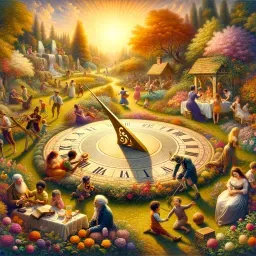”I like this place and could
willingly waste my time in it“

0
0
0
0
- Meaning
- This phrase expresses a sense of contentment and pleasure in one's surroundings, implying that the speaker finds the place so enjoyable that they would not mind spending their time there, even if it meant being unproductive. It highlights the joy of being present in a particular environment and the value of simple pleasures.
- Allegory
- The serene, sunlit glade with lush greenery and flowering plants represents the idyllic and peaceful nature of the place that the speaker finds so appealing. The tranquil stream adds to the calmness and continuity of time, suggesting that the experience of the place is fluid and undisturbed. The person sitting comfortably on a moss-covered rock, with a peaceful smile and relaxed posture, embodies the essence of the quote, showing contentment and willingness to 'waste' time in such a pleasing environment. The golden light filtering through the trees adds a magical quality, representing the transcendent beauty and the timeless feeling of being in a place one loves. The butterflies, birds, and small animals moving leisurely emphasize a harmonious coexistence with nature, reinforcing the idea of enjoying the present moment without haste or pressure.
- Applicability
- This quote can be applied to personal life by encouraging individuals to appreciate and savor the moments and places they love, even if it means taking a break from constant productivity. It suggests that sometimes, it's perfectly fine to enjoy a moment for what it is without worrying about efficiency or output.
- Impact
- This phrase has had a lasting impact on literature and popular culture, often cited to express a deep appreciation for a particular place or moment. It appears in various contexts to underline enjoyment and contentment, resonating with people across centuries who find solace in escaping the pressures of daily life.
- Historical Context
- "As You Like It" was written around 1599-1600, placing this phrase in the late 16th to early 17th century. During this period, English society was experiencing significant cultural and artistic growth, often referred to as the Elizabethan Era. The play reflects themes of nature, pastoral life, and romantic escapism, common in literature of that time.
- Criticisms
- Criticisms of this phrase may stem from its apparent endorsement of idleness. In a world that increasingly values productivity and efficiency, the idea of "wasting time" can be viewed negatively. Some may argue that this perspective undermines the importance of personal growth and contribution to society.
- Variations
- This phrase, while firmly rooted in Western literature due to its origin in Shakespeare, has variations in other cultures that promote enjoyment and appreciation of the moment. For instance, the Japanese concept of "Mono no aware" emphasizes the transient beauty of moments and places, encouraging a deep emotional response to the present.
-

The empty vessel makes the loudest sound.
-

There are more things in heaven and earth, Horatio, than are dreamt of in your philosophy.
-

Pleasure and action make the hours seem short.
-

Levis est labor placidus.
-

By the pricking of my thumbs, something wicked this way comes.
-

The evil that men do lives after them; the good is oft interred with their bones.
-

One touch of nature makes the whole world kin.
-

O, had I but followed the arts!
-

How far that little candle throws his beams! So shines a good deed in a naughty world.
-

They do not love that do not show their love.
-

How poor are they that have not patience! What wound did ever heal but by degrees?
-

A little more than kin, and less than kind.
No Comments